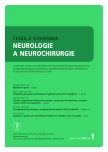Microscopic detection of Cryptococcus in the cerebrospinal fluid as the first symptom of the advanced stage of AIDS – a case study
Authors:
M. Dastych 1; Z. Čermáková 1; P. Štourač 3; A. Ševčíková 2; I. Kocmanová 2; S. Snopková 4
Authors‘ workplace:
Oddělení klinické biochemie a hematologie FN Brno a Katedra laboratorních metod LF MU
1; Oddělení klinické mikrobiologie FN Brno
2; Neurologická klinika FN Brno a LF MU
3; Klinika infekčních chorob FN Brno a LF MU
4
Published in:
Cesk Slov Neurol N 2008; 71/104(1): 93-96
Category:
Case Report
Overview
Opportune infections may be the first serious symptom pointing to the underlying disease in persons with T lymphocyte immunodeficiency. The case study describes the occurrence of Cryptococcus meningitis as the first symptom of advanced HIV/AIDS disease. The diagnosis resulted from a rigorous cytological examination of the cerebrospinal fluid. The microscopic finding was confirmed by a latex test and cultivation with massive growth of Cryptococcus neoformans. Subsequently, HIV/AIDS was diagnosed, with anamnestically documented risk homosexual and heterosexual activit.
Key words:
cryptococcal meningitis – opportunistic infections – cerebrospinal fluid – HIV/AIDS
Sources
1) Prasad KN, Agarwal J, Nag VL, Verma AK, Dixit AK, Ayyagari A. Cryptococcal infection in patients with clinically diagnosed menigitis in a tertiary care center. Neurology India 2003; 51 : 364-366.
2) Chakrabarti A, Sharma A, Sood A, Grover R, Sakhuja V, Prabhakar S et al. Changing scenario of cryptococcosis in a tertiary care hospital in north India. Indian J Med Res 2000; 112 : 56-60.
3) Khanna N, Chandramuki A, Desai A, Ravi V. Cryptococcal infections of the central nervous system: an analysis of predisposing factors, laboratoty findings and outcoume in patients from South India with special reference to HIV infection. J Med Microbiol 1996; 45 : 346-379.
4) Kris Ann K. Oursler, D´Moore R, Chaison RE. Risk factors for cryptococcal meningitis in HIV-infected patients. Aids Research and Human Retroviruses 1999; 15 : 625-631.
5) Kalra SP, Chadha DS, Singh AP, Sanchetee PC, Mohapatra AK. Cryptococcal meningitis in acquired immunodeficiency syndrome. J Assoc Physicians India 1999; 47 : 958-961.
6) Moreira Tde A, Ferreira MS, Ribas RM, Borges AS. Cryptococcosis: clinical epidemiological laboratorial study and fungi varieties in 96 patients. Rev Soc Bras Med Trop 2006; 39 : 255-258.
7) Likasitwattanakul S, Poneprasert B, Sirisanthana V. Cryptococcosis in HIV-infected children. Southeast Asian J Trop Med Public Health 2004; 35 : 935-9359.
8) Lakshmi V, Sudha T, Tejda VD, Umabal P. Prevalence of central nervous system cryptococcosis in human immunodeficiency virus reactive hospitalized patients. Indian J Med Microbiol 2007; 25 : 146-149.
9) Brůčková M, Malý M, Vandasová J. Výskyt a šíření HIV/AIDS v ČR v roce 2006. Zprávy CEM (SZÚ, Praha) 2007; 16 : 36-40.
Labels
Paediatric neurology Neurosurgery NeurologyArticle was published in
Czech and Slovak Neurology and Neurosurgery

2008 Issue 1
- Advances in the Treatment of Myasthenia Gravis on the Horizon
- Memantine in Dementia Therapy – Current Findings and Possible Future Applications
- Memantine Eases Daily Life for Patients and Caregivers
-
All articles in this issue
- Clinical use of antibodies in multiple sclerosis
- Idiopathic generalised epilepsies with typical absences in adults
- Diffuse brainstem gliomas in children. A nightmare for a paediatric oncologist.
- Safety of MRI in patients with metal implants and implanted devices
- Microscopic detection of Cryptococcus in the cerebrospinal fluid as the first symptom of the advanced stage of AIDS – a case study
- Myastenia with Positive Anti-MuSk-positive Antibodies in a Young Man: A Case Report
- Myasthenia gravis
- The Impact of L-DOPA and Entacapon Therapy on Plasma Level of Homocysteine in Parkinson’s Disease Patients
- The Effect of Low Doses of Mannitol on Serum Osmolality
- Mechanical embolectomy by means of the Merci retriever in patients with acute occlusion of brain arteries
- Carotid Endarterectomy and Carotid Angioplasty Stenting as Complementary Treatment Methods: Three Years Experience
- Agenesis of the lateral semicircular canal: a case study
- Optic neuritis caused by mucocele of paranasal sinuses – a casual link or a coincidence? A case study
- A case of multifocal steroid-responsive encephalitis as a cause of intractable frontal lobe seizures
- Czech and Slovak Neurology and Neurosurgery
- Journal archive
- Current issue
- About the journal
Most read in this issue
- Safety of MRI in patients with metal implants and implanted devices
- Diffuse brainstem gliomas in children. A nightmare for a paediatric oncologist.
- Myasthenia gravis
- Clinical use of antibodies in multiple sclerosis
